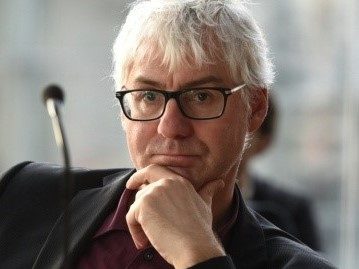Ralf Schmidt-Pleschka
Sebastian Jung has a deceptive way of showing reality. His drawings seem cartoonish, and yet they are full of tragedy and latent violence. The police “kettle” protesters, people storm the Capitol, others sit, exhausted, in a shopping center or snatch scraps of sleep in misery on the sidewalk in front of the Zoo train station in Berlin. Even a visit to the zoo itself is a somber occasion, on the last day before lockdown. The knowledge of the coronavirus crisis that overshadows everything distorts our gaze like the gravitational field of a black hole. The crisis acts as a catalyst for the lines that divide us, deepening and widening the divides in our society.
What is our response to this alarming realization? Is there one? I think there is. Confronted with these dividing lines, we have seen the rise of hope – hope that we can overcome crises in the knowledge that we are all in this together. As one example, the coronavirus crisis has brought home to many that the climate crisis, which is just as big a threat, is still looming. The pandemic has shown that our society can enter action mode, that a lot of things become possible if there is enough will and if we listen to the science. And that includes overcoming what divides us.
By now, many people have realized the climate crisis is still growing. That’s a good thing. After all, 2020, the year marked by the coronavirus crisis, also saw atmospheric CO2 levels rise to the highest levels ever measured. What is the global response? Three degrees! That is how much the average global temperature would rise if we were to achieve the emissions cuts that have been announced thus far by the countries that have signed the Paris Agreement – but have by no means been reached. Three degrees! If the temperature rises just 1.5 degrees, inhabited islands will vanish beneath the sea, and two degrees will take us to the tipping point that makes global warming an irrevocable disaster for the entire planet.
We need more action, a lot more! People used to wave us off by telling us it would take time, that the pace of politics is set by the lowest common denominator. But our experiences during this crisis-racked year have done more than just highlight and deepen the divides between us. They have also given rise to hopes that we can overcome this small-mindedness. And nurturing that hope will do us good.

Ralf Schmidt-Pleschka (born in the Rhineland in 1964) has a Diplom degree in geography. He started his career over 30 years ago in the Bundestag’s study commission on protecting the Earth’s atmosphere. He has been involved with climate action and the energy transition ever since. In addition to professional roles at entities like Die Verbraucher Initiative, as an energy ambassador within the Bundestag, and now as the energy and climate policy coordinator at a green electricity provider, he has also continued his direct involvement in politics to this day. He was a member of the Bonn city council in the 1990s and moved to Berlin in 1999. These days, he splits his time between the hustle and bustle of the big city and a quieter life in Brandenburg.